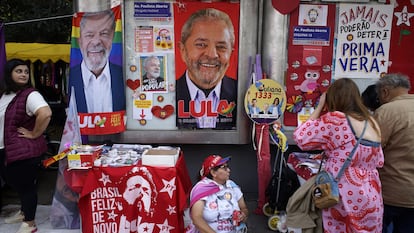Lula scents power as Brazil heads to the polls
The former president is poised to win the first round of the election on Sunday, but it is unclear whether he will be able to avoid a runoff vote against Jair Bolsonaro on October 30


Luiz Inácio Lula da Silva made history two decades ago, when he became the first president of Brazil without a university degree. It was a historic milestone. Lula – as he is popularly known – was the first worker to reach the summit of power in one of the most unequal and classist countries in the world. Now the 76-year-old has the opportunity to return to power and rewrite the last chapter of his political history. The leftist leader of the Workers’ Party (PT) is poised to the first round of the Brazilian presidential election on Sunday. If the polls are correct, Lula will defeat Brazil’s President Jair Messias Bolsonaro by a wide margin – a victory that could heal the trauma caused by the 2016 impeachment of former PT president Dilma Rousseff and consolidate the leftist shift in Latin America, where the left has made gains in Colombia, Chile, Argentina and Mexico.
The main question is whether Lula will win more than 50% of valid votes (not counting blank or invalid votes) on Sunday. If he achieves this, he will win the election outright and avoid a runoff vote against Bolsonaro on October 30. According to the last voter intention poll on Saturday, Lula is predicted to win 50% of the vote and Bolsonaro 36%.
While Bolsonaro won the support of Brazilian soccer player Neymar da Silva Santos Júnior, who encouraged his followers on TikTok to vote for the former military general, Lula has been backed by iconic singer-songwriter Chico Buarque. On Saturday, the Brazilian performer shared a message on Instagram, in which he called on his followers to vote for Lula – even if they didn’t like him – because Brazil’s democracy was in danger. According to Buarque, whose parents helped found the PT during the military dictatorship, Sunday’s vote, was about “saving democracy.”
Another question hanging over the election is whether Bolsonaro will accept the results. The far-right leader has raised doubts about the credibility of Brazil’s electronic voting system, even though it has been working without incident for 25 years. Many Bolsonaro supporters – who make up a third of the electorate – believe the system is rigged against Bolsonaro. And they also question the polls, which for months have given Lula a clear lead. Bolsonaro’s constant attacks against the justice system, the free press and anyone he considers an opponent have slowly eroded Brazil’s democracy. In the lead-up to the October vote, many in Brazil have expressed concerns that Bolsonaro will falsely claim the election has been stolen, which could lead to a constitutional breakdown.
For Lula, the vote is a dispute between democracy and barbarism. For Bolsonaro, it is a fight between good and evil. Around 156 million people are eligible to vote on Sunday. Voters will cast their ballot for president, and also vote for Congress deputies, a third of the Senate, as well as the governors and state legislatures of Brazil’s 27 states.
Under Brazil’s convoluted electoral regulations, political rallies are not allowed the day before an election, but candidates are allowed to parade in public. On Saturday, Lula appeared in a kind of Pope mobile on São Paulo’s main avenue, while Bolsonaro led a group of bikers through the north of the city.
Lula’s rise to power is an incredible story, but his image was tarnished by the Car Wash (Lava Jato) corruption scandal. In 2018, he was convicted of corruption and imprisoned for 20 months. The convictions against him – which have since been overturned – prevented him from contesting the last presidential election in 2018, in which he was also the favorite. Lula has always defended his innocence.

Lula is the son of illiterate parents and the youngest of seven children. Born in the interior of Pernambuco state, a land ravaged by drought, he was seven when he traveled with his mother and siblings in a van for 13 days to the booming city of São Paulo as part of an exodus of northeasterners to the south in 1952. His father, Aristides, was a longshoreman who struggled to feed all his offspring while treating them with a cruelty bordering on sadism, as recounted in his biography, Lula, Volume 1. Life was hard, but there were opportunities. Lula took advantage of them. He worked as a shoeshine and errand boy before entering a vocational school, his springboard to a job as a lathe operator in which he lost a finger; Bolsonaro often calls him “nine fingers.”
Lula became a union leader, and after the military seized power in 1964, he led major strikes against the dictatorship. The PT leader first ran for president in 1989. He was defeated three times before he was finally elected in 2003. His two terms in office (2003-2010) were a time of prosperity for Brazil, thanks to Chinese demand for raw materials. Lula was able to implement ambitious social programs for the historically marginalized. “We put the poor in the budget,” he likes to say. The lives of millions of people greatly improved under his administration. Electricity and appliances that once seemed like luxuries reached the homes of Brazil’s poor. Thanks to that prosperity, many poor people flew in an airplane for the first time. The children of domestic workers were able to go to university – to the ire of the elites, who argued that they had displaced their children.
Lula’s Brazil won over the world and former US president Barack Obama, who, in 2009, described Lula as “the most popular politician on Earth.” The following year, Lula left office with an 87% approval rating.
Lula’s 2022 presidential is focused on bringing back that Brazil – not the Brazil that was seen later, under Rousseff, who he appointed to continue his legacy. Rousseff’s Brazil is linked with systemic corruption, recession and an impeachment that ended 14 years of progressive governments. This context fostered in Brazil a deep hatred of the political class, particularly of the PT. Bolsonaro was able to skillfully ride this wave of discontent to his shock win at the 2018 election.

Today, Brazil is facing another economic crisis. More than 33 million Brazilians are going hungry, unemployment is around 9%, inflation has reached 8.7% and the International Monetary Fund (IMF) estimates that gross domestic product (GDP) will only increase this year by a marginal 1.7%.
If he loses, Bolsonaro will be the first president not to be re-elected so far this century. His inhumane and disastrous management of the Covid-19 pandemic, which has killed 670,000 Brazilians, is the main reason why many former supporters now oppose him. To survive in office, Bolsonaro turned to political parties that offer parliamentary support to the highest bidder, and launched a generous economic aid program to help 20 million poor people. The economy survived the Covid-19 pandemic, but it is still flailing.
Upon coming to power, the ultra-conservative leader, who has expressed his admiration for Brazil’s military dictatorship, set about fulfilling his pledges to dismantle environmental policy, facilitate the sale of arms and place a “terribly evangelical” judge on the Supreme Court. Under Bolsonaro, deforestation has accelerated, the environment has been devastated and the country is more diplomatically isolated than ever.
For many, Lula is seen as a savior. For others, he is the lesser evil and the only politician capable of defeating Bolsonaro. To improve his chances, Lula picked Geraldo Alckmin, a former center-right figure and staunch supporter of Rousseff’s impeachment, as his vice-presidential candidate. The PT leader is promising to bring back prosperity to Brazil, but has not detailed how he intends to resurrect an economy that been stagnating for decades. Nor has he explained how he plans to fund his ambitious programs to lift Brazilians out of poverty.
Lula’s team has reserved Paulista Avenue for Sunday night, but Lula will only make an appearance if he wins the 50% plus one needed to win the election in the first round. Bolsonaro supporters also wanted to gather at the central avenue, but will only be able to do so in the unlikely event that Bolsonsaro wins the election in the first round. A quick count is expected thanks to the electronic voting system, which now – thanks to Bolsonaro – is only a source of pride for half of the country.
Tu suscripción se está usando en otro dispositivo
¿Quieres añadir otro usuario a tu suscripción?
Si continúas leyendo en este dispositivo, no se podrá leer en el otro.
FlechaTu suscripción se está usando en otro dispositivo y solo puedes acceder a EL PAÍS desde un dispositivo a la vez.
Si quieres compartir tu cuenta, cambia tu suscripción a la modalidad Premium, así podrás añadir otro usuario. Cada uno accederá con su propia cuenta de email, lo que os permitirá personalizar vuestra experiencia en EL PAÍS.
¿Tienes una suscripción de empresa? Accede aquí para contratar más cuentas.
En el caso de no saber quién está usando tu cuenta, te recomendamos cambiar tu contraseña aquí.
Si decides continuar compartiendo tu cuenta, este mensaje se mostrará en tu dispositivo y en el de la otra persona que está usando tu cuenta de forma indefinida, afectando a tu experiencia de lectura. Puedes consultar aquí los términos y condiciones de la suscripción digital.








































